形容词讲义
高考英语语法复习形容词与副词 讲义

高考英语形容词与副词一、形容词(1)作定语,常用来修饰名词或代词。
These are valuable suggestions.(这些是宝贵的建议。
)I have something important to tell you.(我有重要的事情要告诉你。
)(2)作表语,放在系动词之后说明主语的情况。
His suggestions are valuable.(他的建议很有价值。
)I felt terrible this morning.(我今天早上感到不舒服。
)(3)作宾语补足语,放在宾语之后对宾语加以修饰说明。
You must keep your eyes closed.(你必须闭上眼睛。
)I find it hard to travel around the big city.(我发现在这个大城市旅行很难。
)(4)作状语,用以说明情况。
Curious, we went into the cave.(出于好奇,我们进了洞里。
)He returned home, safe and sound.(他回到了家,安然无恙。
)形容词作定语时一般置于被修饰词前作前置定语,下列情况中形容词通常后置于被修饰词。
(1)修饰something,anybody,nobody,anything等复合不定代词时There is nothing wrong with the machine.(机器什么问题都没有。
)(2)形容词词组作定语时She bought a book suitable for children.(她买了本适合孩子们的图书。
)(3)修饰表示数量的词要后置The baby is only five months old.(这个婴儿仅有五个月大。
)(4)enough作形容词修饰名词时,一般放在名词之前,也可放在名词之后We don't bring enough money.(我们没带够钱。
)There‘ll be time enough to relax when you’ve finished your work.(你完成工作后会有足够的时间来放松。
形容词副词讲义(精选.)

形容词副词定义:中文的意思是“……的”的词是形容词,用来修饰名词;中文意思是“……地”的词是副词,用来修饰动词、形容词或副词形容词与副词在句中的位置形容词形容词的比较级在句中的位置名词所有格副词的比较级形容词副词的转换考点清单练习:练习①It is a ____(sun) day.②It is a _____(rain) day.③I think you are a _____(luck) girl.④The teacher said he had _____to tell us.A. anything importantB. important anythingC. something importantD. important something⑤Look !Jack is ____(excite,excited) .⑥I feel ____(happy) every day.⑦The baby is sleeping ,please keep______(quiet,quietly)考点二:形容词的比较级(1)在形容词词尾加上“er”“est”构成比较级、最高级:bright(明亮的)—brighter—brightest broad(广阔的)—broader—broadest cheap(便宜的)—cheaper—cheapest clean(干净的)—cleaner—cleanest clever(聪明的)—cleverer—cleverest cold(寒冷的)—colder—coldestcool(凉的)—cooler—coolest dark(黑暗的)—darker—darkest dear(贵的)—dearer—dearest deep(深的)—deeper—deepestfast(迅速的)—faster—fastest few(少的)—fewer—fewestgreat(伟大的)—greater—greatest hard(困难的,硬的)—harder—hardest high(高的)—higher—highest kind(善良的)—kinder—kindestlight(轻的)—lighter—lightest long(长的)—longer—longestloud(响亮的)—louder—loudest low(低的)—lower—lowestnear(近的)—nearer—nearest new(新的)—newer—newestpoor(穷的)—poorer—poorest quick(快的)—quicker—quickest quiet(安静的)—quieter—quietest rich(富裕的)—richer—richestshort(短的)—shorter—shortest slow(慢的)—slower—slowestsmall(小的)—smaller—smallest smart(聪明的)—smarter—smartest soft(柔软的)—softer—softest strong(强壮的)—stronger—strongest sweet(甜的)—sweeter—sweetest tall(高的)-taller-tallestthick(厚的)—thicker—thickest warm(温暖的)—warmer—warmest weak(弱的)—weaker—weakest young(年轻的)—younger—youngest (2).双写最后一个字母,再加上“er”“est”构成比较级、最高级:big(大的)—bigger—biggest fat(胖的)—fatter—fattesthot(热的)—hotter—hottest red(红的)—redder—reddestsad(伤心的)—sadder—saddest thin(瘦的)—thinner—thinnestwet(湿的)—wetter—wettest mad(疯的)—madder—maddest(3).以不发音的字母e结尾的形容词,加上“r”“st”构成比较级、最高级:able(能干的)—abler—ablest brave(勇敢的)—braver—bravest close(接近的)—closer—closest fine(好的,完美的)—finer—finest large(巨大的)—larger—largest late(迟的)—later—latestnice(好的)—nicer—nicest ripe(成熟的)—riper—ripestrude(粗鲁的)—ruder—rudest safe(安全的)—safer—safeststrange(奇怪的)—stranger—strangest wide(宽广的)—wider—widestwise(睿智的,聪明的)—wiser—wisest white(白的)—whiter—whitest(4).以字母y结尾的形容词,把y改为i,再加上“er”“est”构成比较级、最高级:busy(忙碌的)—busier—busiest dirty(脏的)—dirtier—dirtiestdry(干燥的)—drier—driest early(早的)—earlier—earliesteasy(容易的)—easier—easiest friendly(友好的)—friendlier—friendliest funny(好玩的)—funnier—funniest happy(开心的)—happier—happiest healthy(健康的)—healthier—healthiest heavy(重的)—heavier—heaviesthungry(饿的)—hungrier—hungriest lazy(懒惰的)—lazier—laziestlucky(幸运的)—luckier—luckiest naughty(调皮的)—naughtier—naughtiest noisy(嘈杂的)—noisier—noisiest pretty(美丽的)—prettier—prettiestsilly(傻的)—sillier—silliest spicy(辣的)—spicier—spiciestthirsty(渴的)—thirstier—thirstiest ugly(丑的)—uglier—ugliest(5).双音节、多音节形容词,在单词前面加上“more”“most”构成比较级、最高级:afraid(害怕的)—more afraid—most afraidbeautiful(美丽的)—more beautiful—most beautifulcareful(仔细的)—more careful—most carefulcheerful(开心的)—more cheerful—most cheerfulcrowded(拥挤的)—more crowded—most crowdeddangerous(危险的)—more dangerous—most dangerousdelicious(美味的)—more delicious—most deliciousdifficult(困难的)—more difficult—most difficultexciting(令人兴奋的)—more exciting—most excitingexpensive(昂贵的)—more expensive—most expensivefamous(著名的)—more famous—most famousfrightened(受惊的)—more frightened—most frightenedfrightening(令人害怕的)—more frightening—most frighteninghard-working(勤奋的)—more hard-working—most hard-workinghelpful(有帮助的)—more helpful—most helpfulhonest(诚实的)—more honest—most honestimportant(重要的)—more important—most importantinteresting(有趣的)—more interesting—most interestingpolite(有礼貌的)—more polite—most politeterrible(可怕的)—more terrible—most terribletired(累的)—more tired—most tired(6).不规则变化的形容词:bad(坏的)—worse—worst far(远的)—farther—farthest (far—further—furthest) good(好的)—better—best ill(病的)—worse—worstlittle(少的)—less—least many(多的)—more—most much(多的)—more—most old(年老的)—older—oldest ( old—elder—eldest) well(好的,身体好的)—better—best练习1. Is your friend ____ (young) than you ?2. Shanghai is one of ______ (big) cities in the world.3. Do you think English is _____important than maths。
高考英语复习形容词和副词知识点讲解讲义(必考点)
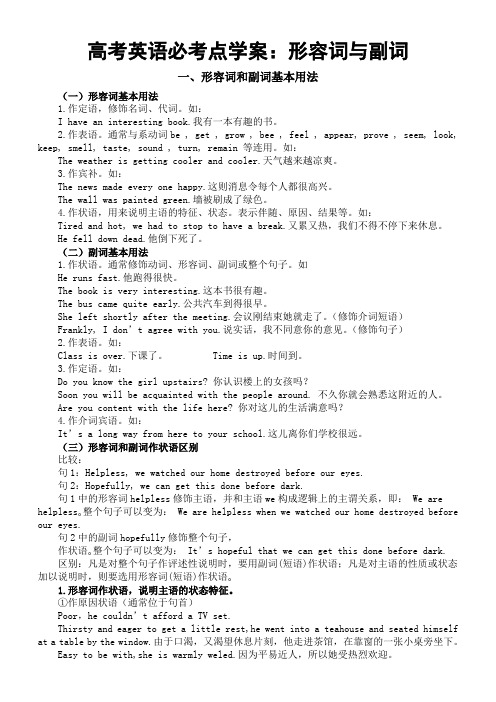
高考英语必考点学案:形容词与副词一、形容词和副词基本用法(一)形容词基本用法1.作定语,修饰名词、代词。
如:I have an interesting book.我有一本有趣的书。
2.作表语。
通常与系动词be , get , grow , bee , feel , appear, prove , seem, look, keep, smell, taste, sound , turn, remain 等连用。
如:The weather is getting cooler and cooler.天气越来越凉爽。
3.作宾补。
如:The news made every one happy.这则消息令每个人都很高兴。
The wall was painted green.墙被刷成了绿色。
4.作状语,用来说明主语的特征、状态。
表示伴随、原因、结果等。
如:Tired and hot, we had to stop to have a break.又累又热,我们不得不停下来休息。
He fell down dead.他倒下死了。
(二)副词基本用法1.作状语。
通常修饰动词、形容词、副词或整个句子。
如He runs fast.他跑得很快。
The book is very interesting.这本书很有趣。
The bus came quite early.公共汽车到得很早。
She left shortly after the meeting.会议刚结束她就走了。
(修饰介词短语)Frankly, I don’t agree with you.说实话,我不同意你的意见。
(修饰句子)2.作表语。
如:Class is over.下课了。
Time is up.时间到。
3.作定语。
如:Do you know the girl upstairs? 你认识楼上的女孩吗?Soon you will be acquainted with the people around. 不久你就会熟悉这附近的人。
形容词与副词 --讲义

形容词与副词用来描述事物大小,形状,颜色等具体特征的词叫做形容词。
1作定语修饰名词和不定代词形容词修饰名词作前置定语。
放在被修饰词之后,作后置定语。
1)形容词修饰something ,anything等复合不定代词时后置。
2,the+形容词,表示一类人注意;作主语谓语动词用复数4形容词的比较等级原级1.形容词的原级比较句型有:1) as +形容词的原级+as.其否定式为:not so (as)+形容词原级+as。
2)当我们要表示A是B的几倍或几分之几时,我们用的句型:A +几倍或几分之几as +形容词的原级+as +B。
This room is three times as big as that one.3) as many+可数名词/much+不可数名词+as.He earns as much money as his mother does.比较级和最高级大多数形容词的比较级和最高级是采用在词尾加-er和-est的形式,或在单词前加more和most构成。
3)特殊形式的比较级和最高级:英文中有些形容词的比较级和最高级的变化是不规则的。
如:原级比较级最高级good/well better bestbad/ill worse worstfar farther/further farthest/furthestold older/elder oldest/oldestlittle less leastmany/much more mostlate later/latter latest/last※对于上述形容词中有两种不同形式的特殊比较级和最高级用法做一下说明:a) farther/farthest和further/furthest的比较四个词都可以表示实际的距离。
但是further/furthest可用于指抽象意义,表示―进一步的,更深入的‖。
further study进一步研究b) older/oldest和elder/eldest的比较elder/eldest主要用来表示家庭成员之间的长幼关系my elder brother我的哥哥his eldest son他的长子在有than的比较句中一般不用elder,要用older.I am two years older than Tom.我比汤姆大两岁。
22形容词和副词(讲义)-2020年初升高英语无忧衔接

2020年初升高英语无忧衔接第二章语法知识衔接专题二:形容词和副词讲义第一部分:形容词一、形容词的比较级和最高级1、比较的对象常用that和those来代替,The bikes in this shop are more expensive than those in that one.This is the most interesting book I have ever read.2、修饰比较级的副词有rather,much, even, still, a bit, a little, a lot, any, no等。
常被误用的有more, less ,very ,quite, fairly, greatly.The man got even more angry.The experiment will bee much easier if it is done in this way.3、many more+ 名词和much more+名词都可以,区别在于后面的名词是可数还是不可数名词。
I bought many more books than I needed.They have much more rain here this year than they did last year .4、修饰最高级的词有by far, far, much, the very, of all.This is by far the most expensive car I have ever seen.The library is the highest building of all in the city.二、形容词的位置1、以a开头的形容词只能作表语,不能用在名词之前。
如:alone,awake,alive,asleep,afraid2、something,anything,nothing 定语后置Do you have something to eat?I have something important to tell you3、名词前有多个形容词,它们的位置比较复杂。
形容词副词讲义及练习

专题五形容词及副词知识摘要用法形容词的功能:定语、表语或宾语补足语用法副词功能:定语、表语或宾语补足语形容词和副词形容词与副词的转化形容词、副词的比较级与最高级的变化规律原级的用法形容词、副词的比较等级比较级的用法最高级的用法考点梳理考点一、形容词的用法及位置1、形容词的用法形容词是用来描写或修饰名词(或代词)的一类词。
在句子可做定语、表语或宾语补足语等。
Peter is tall. 彼得个子高。
(做表语)We must keep our room clean. 我们必修保持我们的房间干净。
(做宾补) 2.、形容词的位置(1) 形容词作定语时一般放在它所修饰的词的前面。
I think it’s an interesting book. 我认为它是一本有趣的书。
(2) 形容词修饰复合不定代词时放在复合不定代词之后。
She has something important to tell us. 她有重要的时期要告诉我们。
【知识拓展】2、以-ly结尾的形容词:friendly 友好的lonely 孤独的lovely 可爱的likely 可能的daily 日常的lively 有生气的考点二、副词的用法及位置1、副词的功能及用法副词是用来修饰动词、形容词、其它副词以及全句的词,在句子中可作状语、表语、定语和宾语补足语。
The students are working hard in the school. 学生们正在学校努力学校。
I’m afraid I must be off now. 恐怕我现在得走了。
2、副词的位置(1)修饰动词,多数位于动词之后,及动词的宾语之后。
She speaks English well. 她英语说得好。
(2)频度副词(always, never, often等)通常放在行为动词之前,情态动词、be动词、助动词之后。
但是sometimes 位置较灵活,他还可以放在句中的开头或结尾。
英语专题讲义: 形容词(带答案)

中考英语专题讲义:形容词(带答案)北辰教育学科老师辅导讲义something, anything, nothing, everythin表示长、宽、高、深及年龄的形容词,应放在相应的名词之后。
The Great Wall is over six thousand kiEnglish-speaking, glass-stoppe -bleA. easierB. much easyC. more easilyD. too easyA. fewB. a fewC. littleD. a littleA. hardlyB. fina15. W e feel so that China has sent its first space laboratory, Tiangong-1 into orbit successfully.A.beautifulB. uglierC. more expensiveD. prettiest24. Among the earrings I choose pair because I didnA. most qu例句A. cheapB. cheaperC. expensiveD. more expensive二、英语书面表达专项训练2.目前,许多中学生利用周末和节假日上课外补习班,对此人们有不同的看法。
请根据下面内容写一篇短文。
注意:1. 表达清楚,语法通顺,上下文连贯;2. 必须包括提示的所有信息,并适当发挥,至少两点;3. 词数:100词左右(文章开头已给出,不计入总词数);4. 不得使用真实姓名、校名和地名等。
Nowadays, many middle school students are taking all kinds of after-school classes at weekends or on holidays. There are two different opinions about it.Some people think that_______________________________________________________________________________ _______________________________________________________________________________ _______________________________________________________________________________ _______________________________________________________________________________ ____________________________【答案】Nowadays, many middle school students are taking all kinds of after-school classes at weekends or on holidays. There are two different opinions about it.Some people think that students can get better exam results and go to better senior high schools by taking extra classes. They also believe that students can avoid watching too much TV or playing computer games in this way.But others have a different opinion. They think that students need more time to rest. If theytake too many classes, they mi ght feel too stressed. That’s not good for their health.As for me, I don’t think taking extra classes is necessary. Learning hard in class is enough. We just need to go over our lessons after class. We can also teach ourselves as it is very important for us to have a lifelong learning ability.【解析】【分析】整体分析:这是一篇提纲话题作文。
初中英语形容词副词讲义

第六讲形容词和副词教学目标1.掌握形容词和副词的基本用法2. 学会形容词和副词的比较等级3. 熟记形容词和副词的变化规则4. 利用形容词和副词的相关知识答题。
课程类型新授课课程时长 1.5h重点句子1.The Spring Festival is the most important traditional festival in China春节是中国最重要的传统节日。
2.Thanks to the government,our hometown has developed rapidly in recent years.The living conditions are much better and more comfortable.多亏了政府,我们的家乡近几年发展迅速,生活条件变得更好,更加舒适课堂导入Heavy Heavier The heaviestThe pig is heavy .The lion is heavier than the pig.The elephant is the heaviest of the three.考点一形容词和副词的基本用法[拓展] 形容词的其他用法(1)“the+形容词”表示一类人或物,如:the old 老人。
(2)形容词常用句式:①“It's+adj.+for+sb.+to do sth.” 表示“做某事对某人来说是……的”。
在这一句型中,常用描述事物性质的形容词,如: easy, difficult, important, dangerous等。
例:It is important for us ________ (work) hard.①“It's+adj.+of+sb.+to do sth.” 表示“某人做某事是……的”。
在这一句型中,常用描述行为者的性格、品质的形容词.如: good, kind, nice, polite, clever, foolish, lazy, careful等。
形容词比较级最高级(讲义)六年级下册
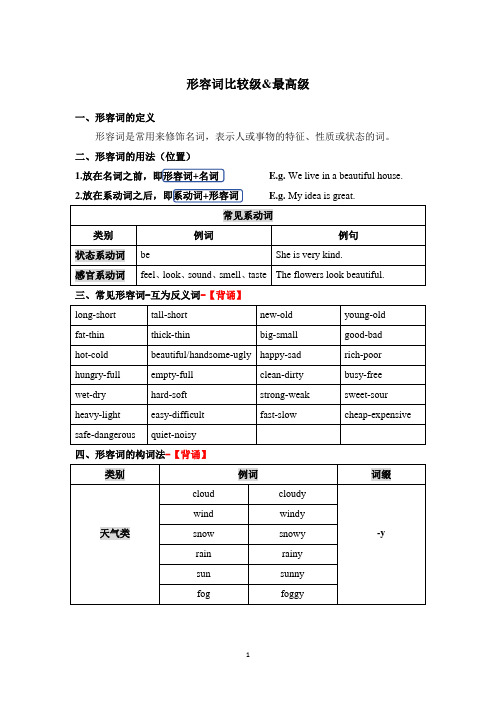
形容词比较级&最高级一、形容词的定义形容词是常用来修饰名词,表示人或事物的特征、性质或状态的词。
二、形容词的用法(位置)1.放在名词之前,即形容词+名词 E.g. We live in a beautiful house.2.放在系动词之后,即系动词+形容词 E.g. My idea is great.常见系动词类别例词例句状态系动词be She is very kind.感官系动词feel、look、sound、smell、taste The flowers look beautiful.三、常见形容词-互为反义词-【背诵】long-short tall-short new-old young-oldfat-thin thick-thin big-small good-badhot-cold beautiful/handsome-ugly happy-sad rich-poor hungry-full empty-full clean-dirty busy-freewet-dry hard-soft strong-weak sweet-sour heavy-light easy-difficult fast-slow cheap-expensive safe-dangerous quiet-noisy四、形容词的构词法-【背诵】类别例词词缀天气类cloud cloudy-y wind windysnow snowyrain rainysun sunnyfog foggy五、多个形容词修饰名词的排序-【美小圆旧黄,法国木书房】【美】一般描绘性形容词:beautiful,ugly,bad, interesting, boring...【小】表示大小,长短,高低的形容词:small,big, long, short, tall,high,low... 【圆】表示形状的形容词:round,square...【旧】表示年龄,新旧的形容词:old, young,new...【黄】表示颜色的形容词:yellow,red,green,blue,black...【法国】表示国籍,地区,出处的形容词:French, Chinese,Japanese... 【木】表示物质,材料的形容词:wooden,golden,woolen(羊毛的)【书房】表示被修饰的名词:study,skirt,car,house...如:一张又大又漂亮的棕色圆形新木桌a beautiful big round new brown wooden table六、形容词比较级&最高级的变化规则1.规则变化-【背诵】类别构成方法原级比较级最高级单音节词和少数双音节词一般情况,直接+er,estlong longer longesttall taller tallest 以不发音的e结尾,+r,stlate later latestlarge larger largest 以“辅音字母+y”结尾,变y为i,+er,esteasy easier easiesthappy happier happiest 以“重读闭音节,辅元辅结构”结尾,双写尾字母,+er,estbig bigger biggesthot hotter hottest多音节词和部分双音节词在原级前,+more,mostcareful more careful most carefulbeautiful more beautiful most beautiful2.不规则变化-【背诵】原级比较级最高级good/well better best bad worse worst many/much more most little less leastfar farther(较远)farthest(最远)further(较远;进一步)furthest(最远;最大限度) old older(年纪较大的)oldest(年纪最大的)elder(较年长的)eldest(最年长的)七、形容词原级&比较级&最高级的句型1.形容词原级的用法①肯定句中的结构:A+be+as+形容词原级+as+B. (A和B一样)The football is as big as the basketball.②否定句中的结构:A+be+not+as+形容词原级+as +B. (A不如B)This book isn't as new as that one.2.形容词比较级的用法①表示“A比B更...”的结构:A+be+adj.比较级+than+B.The snake is longer than the ruler.②表示“A越来越…”的结构:a.A+be+adj.比较级+and+adj.比较级.Tina is getting older and older.b.A+be+more and more+adj.原级. (当adj.为多音节词或部分双音节词时)Amy is more and more beautiful.③表示“哪一个/谁更…”的结构:Who/Which+be+adj.比较级,A or B?Who is thinner,Tom or Jack?④表示“A是两者之间比较...的一个”的结构:A+be+the+adj.比较级(of the two). Tom is the thinner of the two.⑤表示“越…,就越…”的结构:the +比较级...,the+比较级…The more you eat,the fatter you will be.3.形容词最高级的用法①表示“A是(范围中)最...的”的结构:A+be+the+adj.最高级+in/of+范围. Betty is the tallest in her class.②表示“A是(范围中)最...的之一”的结构:A+be+one of +the+adj.最高级+n.复数(+范围). Yao Ming is one of the best basketball players.The Great Wall is one of the greatest wonders in the world.③表示“哪一个/谁最…”的结构:Which/Who+be+the+adj.最高级,A,B or C?Which city is the most beautiful, Beijing, Shanghai or Suzhou?④表示“A是(范围中)第几最”的结构:A+be+ the+序数词+adj.最高级+n.单数+范围.The Yellow River is the second longest river in China.【注意】:形容词最高级前面有物主代词、指示代词、名词所有格等修饰,不需要再用定冠词。
初中英语形容词和副词讲义

讲义3 :形容词一、形容词的定义:表示人或事物的属性,特征或状态的词叫形容词(Adjective).形容词修饰名词,它的基本用法就是为名词提供更多的信息,它分为性质形容词和叙述形容词两类.二、形容词的位置1、单个形容词修饰名词时,一般要放在名词的前面,做定语。
它们的前面常常带有冠词、形容词性物主代词、指示代词、数词等。
例如:a red flower一朵红花 this interesting story这个有趣的故事six blind men 六个盲人 my own house我自己的房子形容词修饰something, anything, nothing, everything等不定代词时,形容词放在名词后面。
例如:I have something important to tell you.Is there anything interesting in the film.三、形容词和副词的等级变化大多数形容词和副词有三个级:原级(即原形)、比较级和最高级。
1 一般在词末尾加er变比较级,加est变最高级。
strong —stronger -strongest small--smaller--smallest hard→harder →hardest fast→faster →fastest2 如果以e结尾,只加r 或st。
nice--nicer--nicest fine--finer--finest3 以重读闭音节,末尾只有一个辅音字母,须先双写这个辅音字母,再加er或est。
sad--sadder-- saddest big--bigger--biggest hot--hotter --hottest4 以辅音字母加y结尾的词,把y变成i,再加er或est。
angry--angrier-angriest early→earlier →earliest hungry-hungrier-hungriest5、但是,开放类副词即形容词加ly结尾变成的副词加more或most.如quickly →more quickly →most quickly quietly →more quietly →most quietlyslowly—more slowly—most slowly[注]:early中的ly不是后缀,故把y变i再加er和est6、大部分双音节和所有多音节词都在其前面加more变比较级,加most变最高级different -more different -most differentbeautiful--more beautiful--the most beautifulexpensive--more expensive--the most expensive但是,以形容前缀un结尾的三音节形容词不适合上述情况,如unhappy,untidy,我们可以说:unhappier→u nhappiest,形容词比较级和最高级的不规则变化四.形容词副词的用法1."the+形容词",表示一类人或事物,相当于名词,用作主语及宾语The old often think of old things.2 "The+形容词比较级..., the+形容词比较级..."表示 " 越... 就越..."。
形容词、副词讲义
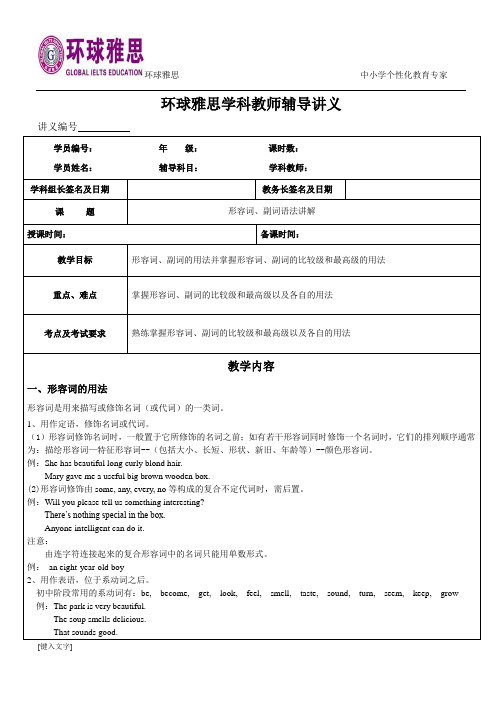
best
bad/badly/ill
worse
worst
little
less
least
many/much
more
most
far
farther/further
farthest/furthest
old
older/elder
oldest/eldest
2、形容词、副词比较等级的用法。
(1)原级常用于“as+原级+as”结构,表示一方和另一方程度相同,意思是“……和……一样”。
long
tall
longer
taller
longest
tallest
以字母-e结尾的词,加-r或-st
large
nice
larger
nicer
largest
nicest
以“辅音字母+y”结尾的词,先变y为i,再加-er或-est
busy
heavy
funny
early
busier
heavier
funnier
例:She has beautiful long curly blond hair.
Mary gave me a useful big brown wooden box.
(2)形容词修饰由some, any, every, no等构成的复合不定代词时,需后置。
例:Will you please tell us something interesting?
环球雅思学科教师辅导讲义
讲义编号
学员编号:年级:课时数:
学员姓名:辅导科目:学科教师:
学科组长签名及日期
教务长签名及日期
形容词和副词的用法重点讲义资料
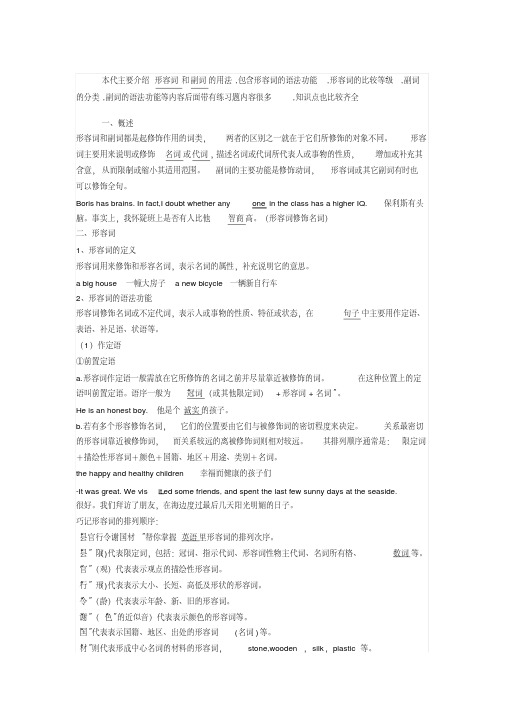
本代主要介绍形容词和副词的用法,包含形容词的语法功能,形容词的比较等级,副词的分类,副词的语法功能等内容后面带有练习题内容很多,知识点也比较齐全一、概述形容词和副词都是起修饰作用的词类,两者的区别之一就在于它们所修饰的对象不同。
形容词主要用来说明或修饰名词或代词,描述名词或代词所代表人或事物的性质,增加或补充其含意,从而限制或缩小其适用范围。
副词的主要功能是修饰动词,形容词或其它副词有时也可以修饰全句。
Boris has brains. In fact,I doubt whether any one in the class has a higher IQ. 保利斯有头脑。
事实上,我怀疑班上是否有人比他智商高。
(形容词修饰名词)二、形容词1、形容词的定义形容词用来修饰和形容名词,表示名词的属性,补充说明它的意思。
a big house 一幢大房子 a new bicycle一辆新自行车2、形容词的语法功能形容词修饰名词或不定代词,表示人或事物的性质、特征或状态,在句子中主要用作定语、表语、补足语、状语等。
(1)作定语①前置定语a.形容词作定语一般需放在它所修饰的名词之前并尽量靠近被修饰的词。
在这种位置上的定语叫前置定语。
语序一般为“冠词(或其他限定词)+形容词+名词”。
He is an honest boy.他是个诚实的孩子。
b.若有多个形容修饰名词,它们的位置要由它们与被修饰词的密切程度来决定。
关系最密切的形容词靠近被修饰词,而关系较远的离被修饰词则相对较远。
其排列顺序通常是:限定词+描绘性形容词+颜色+国籍、地区+用途、类别+名词。
the happy and healthy children幸福而健康的孩子们-It was great. We vis it ed some friends, and spent the last few sunny days at the seaside.很好。
形容词、副词讲义
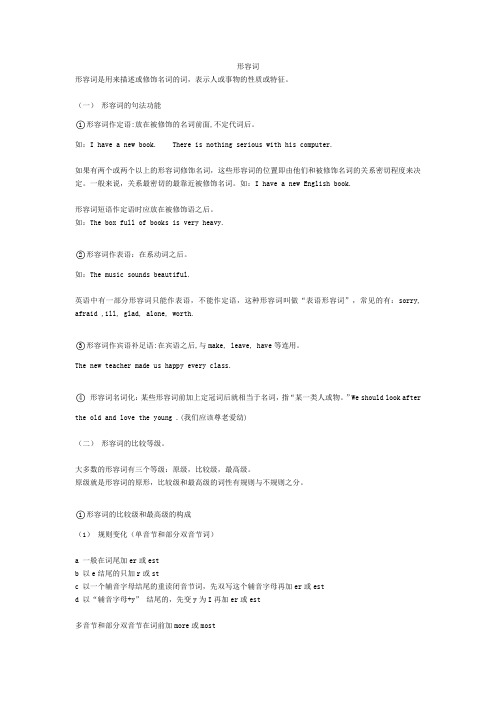
形容词形容词是用来描述或修饰名词的词,表示人或事物的性质或特征。
(一)形容词的句法功能○1形容词作定语:放在被修饰的名词前面,不定代词后。
如:I have a new book. There is nothing serious with his computer.如果有两个或两个以上的形容词修饰名词,这些形容词的位置即由他们和被修饰名词的关系密切程度来决定。
一般来说,关系最密切的最靠近被修饰名词。
如:I have a new English book.形容词短语作定语时应放在被修饰语之后。
如:The box full of books is very heavy.○2形容词作表语:在系动词之后。
如:The music sounds beautiful.英语中有一部分形容词只能作表语,不能作定语,这种形容词叫做“表语形容词”,常见的有:sorry, afraid ,ill, glad, alone, worth.○3形容词作宾语补足语:在宾语之后,与make, leave, have等连用。
The new teacher made us happy every class.○4形容词名词化:某些形容词前加上定冠词后就相当于名词,指“某一类人或物。
”We should look after the old and love the young .(我们应该尊老爱幼)(二)形容词的比较等级。
大多数的形容词有三个等级:原级,比较级,最高级。
原级就是形容词的原形,比较级和最高级的词性有规则与不规则之分。
○1形容词的比较级和最高级的构成(1)规则变化(单音节和部分双音节词)a 一般在词尾加er或estb 以e结尾的只加r或stc 以一个辅音字母结尾的重读闭音节词,先双写这个辅音字母再加er或estd 以“辅音字母+y”结尾的,先变y为I再加er或est多音节和部分双音节在词前加more或most(2)不规则变化good/well- better-best bad/ill/badly- worse –worst little- less- least many/much-more- most far-farther- farthest old –elder-elder(年长的)○2形容词比较等级的用法(1)形容词原级用法英语中同级比较句型常用的有两种:as+形容词原级+as和not so(as) 形容词原级+as…句型。
形容词和副词讲义
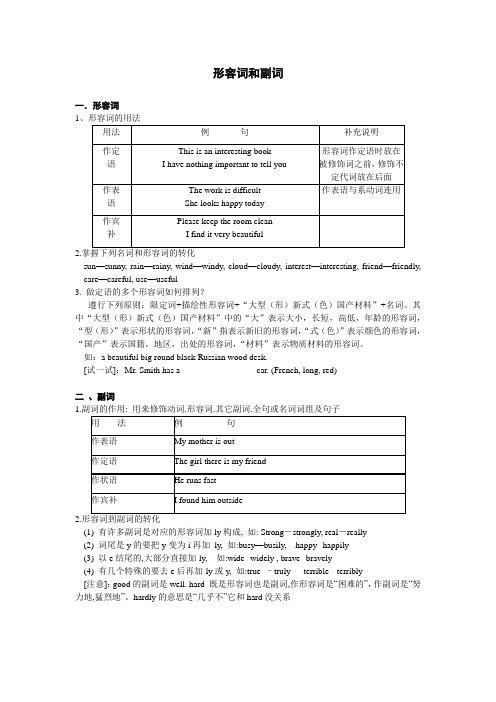
形容词和副词一.形容词12.sun—sunny, rain—rainy, wind—windy, cloud—cloudy, interest—interesting, friend—friendly, care—careful, use—useful3. 做定语的多个形容词如何排列?遵行下列原则:限定词+描绘性形容词+“大型(形)新式(色)国产材料”+名词。
其中“大型(形)新式(色)国产材料”中的“大”表示大小,长短,高低,年龄的形容词,“型(形)”表示形状的形容词,“新”指表示新旧的形容词,“式(色)”表示颜色的形容词,“国产”表示国籍,地区,出处的形容词,“材料”表示物质材料的形容词。
如:a beautiful big round black Russian wood desk.[试一试]:Mr. Smith has a _________________car. (French, long, red)二、副词1.2.形容词到副词的转化(1) 有许多副词是对应的形容词加ly构成, 如: Strong-strongly, real-really(2) 词尾是y的要把y变为i再加ly, 如:busy—busily, happy--happily(3) 以e结尾的,大部分直接加-ly, 如:wide--widely , brave--bravely(4) 有几个特殊的要去e后再加-ly或y, 如:true –truly terrible --terribly[注意]:good的副词是well. hard 既是形容词也是副词,作形容词是“困难的”,作副词是“努力地,猛烈地”。
hardly的意思是“几乎不”它和hard没关系三.形容词和副词的比较级和最高级4.使用形容词比较级时(1)在形容词比较级前可用much, even ,still ,a little, a bit, far, a lot来修饰,表示程度。
形容词、副词的比较级和最高级讲义

一. 形容词、副词的比较级和最高级一.形容词、副词的级:原级,比较级,最高级二.形容词、副词三个级的用法:1.原级比较,和……一样as +原级+as (否定:not so/as …as)eg. They run quite fast. 他们跑得相当快。
Jimmy is as tall as his father. 吉姆和他的爸爸一样高。
He studies as hard as his brother. 他和他哥哥学习一样努力。
2.二者比较时(用比较级),比较级+thaneg. Helen is taller than me/I (am). 海伦比我高。
She runs faster than he (does). 她跑得比他快。
3.the+最高级+(名词)+范围,表示在……中是最……的eg. The dress is the largest in the shop. 这条裙子是店里最大的。
He runs (the) fastest in our class.■不规则变化:两多两好三不好,一老一远加一少(最高级前要用the,副词最高级前面可省略)四.比较级的其他句型结构1. 表示两者之间的选择,可使用“Which/Who+ 谓语动词+比较级, …or …?●Which one is ______________, this one or that one?A. goodB. badC. bestD. worseeg. Which T-shirt is nicer, this one or that one?2. 比较级+and+比较级或more and more +原级,表示越来越……eg. It becomes warmer and warmer when spring comes.It is getting cooler and cooler.Our school is becoming more and more beautiful.● The weather is becoming ______________.A. hotter and hotterB. more hot and hotC. hoter and hoterD. more and more hot● I like Meishan ___________ because it is becoming __________.A. well; beautifulB. better; more and more beautifulC. well; more and more beautifulD. better; beautiful and beautiful●—I talked with my little uncle on the computer last night.--The internet makes the world _________________.A. small and smallB. smaller and smallerC. small and smallerD. smaller and small3. the+比较级,the+比较级,越……,越……eg. The more we get, the happier we feel.The sooner, the better.The harder you work, the better grades you’ll get.● ___________ you’re, __________ mistakes you’ll make.A. The careful, the lessB. The more careful, the lessC. The more carefully, the fewerD. The more careful, the fewer●–The more you practice, ___________ your English will be.-- I agree. Practice makes perfect.A. the betterB. the worseC. moreD. less4.the+比较级+of,表示两者之间较……的一个eg. Nancy and Lucy are twins. In some way they look the same, but Nancy is the taller of the two.5. 比较级+than+ any+ other+名词(单数),表示比其他任何的……都……(比较级的形式表示最高级的含义)eg. He is taller than any other student in his class.=He is the tallest student in his class.他比他班上的任何一个学生都高。
Unit 3 The语法-形容词讲义(含答案) 2024-2025学年沪教版(2024七年级英语上册
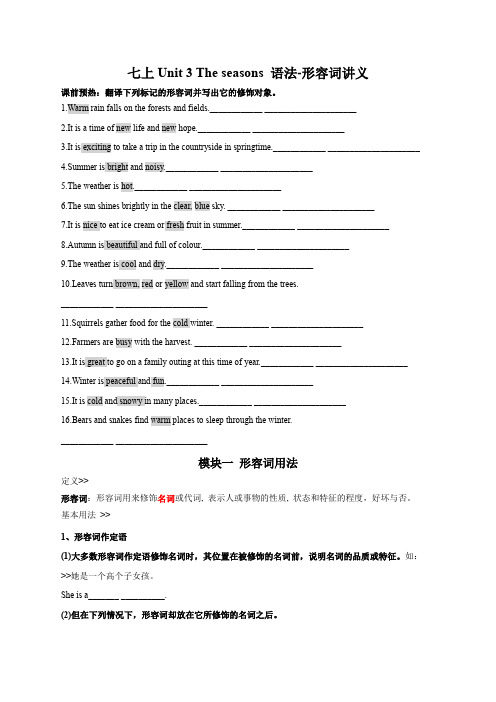
七上Unit 3 The seasons 语法-形容词讲义课前预热:翻译下列标记的形容词并写出它的修饰对象。
1.Warm rain falls on the forests and fields.____________ _____________________2.It is a time of new life and new hope.____________ _____________________3.It is exciting to take a trip in the countryside in springtime.____________ _____________________4.Summer is bright and noisy.____________ _____________________5.The weather is hot.____________ _____________________6.The sun shines brightly in the clear, blue sky. ____________ _____________________7.It is nice to eat ice cream or fresh fruit in summer.____________ _____________________8.Autumn is beautiful and full of colour.____________ _____________________9.The weather is cool and dry.____________ _____________________10.Leaves turn brown, red or yellow and start falling from the trees.____________ _____________________11.Squirrels gather food for the cold winter. ____________ _____________________12.Farmers are busy with the harvest. ____________ _____________________13.It is great to go on a family outing at this time of year.____________ _____________________14.Winter is peaceful and fun.____________ _____________________15.It is cold and snowy in many places.____________ _____________________16.Bears and snakes find warm places to sleep through the winter.____________ _____________________模块一形容词用法定义>>形容词:形容词用来修饰名词或代词, 表示人或事物的性质, 状态和特征的程度,好坏与否。
形容词讲义
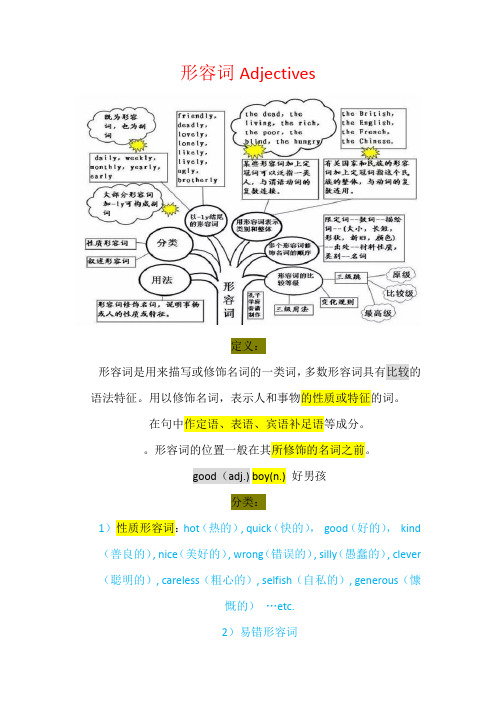
形容词Adjectives定义:形容词是用来描写或修饰名词的一类词,多数形容词具有比较的语法特征。
用以修饰名词,表示人和事物的性质或特征的词。
在句中作定语、表语、宾语补足语等成分。
形容词的位置一般在其所修饰的名词之前。
good(adj.) boy(n.) 好男孩分类:1)性质形容词:hot(热的), quick(快的),good(好的),kind (善良的), nice(美好的), wrong(错误的), silly(愚蠢的), clever (聪明的), careless(粗心的), selfish(自私的), generous(慷慨的)…etc.2)易错形容词形容词的三级形式1.原级(指形容词的原形)2.比较级(用来表示“较......”或“更......一些”,两者之间进行比较,通常用“than”连接)3.最高级(表示“最......”大于或等于三者以上进行比较,最高级前面要加定冠词“the”)如:A is tall.A是高的。
A is taller than B.A比B更高。
A is the tallest of the three.A是三人中最高的。
1.原级一.形容词原级的用法1.说明人或事物自身的特点、性质和状态,放在形容词之后。
(形容词放在系动词之后被称作表语)形容词作表语,作表语的形容词都是表示人物性质或特征常见系动词:1)be动词:be,is,am,are,was,were,been2)感官类:feel(感觉),look,appear(出现),seem(似乎),sound(听起来),taste(尝起来),smell(闻起来)3)变化类:become(变得),grow(生长),get(得到),go,turn(变成),fall(落下)4)表保持:keep(保留),stay(待在),remain(遗留)Pan Changjiang is (系)funny. 潘长江是很滑稽的。
Our teacher wants us to be (系)confident when we talk with the foreigners.我们的老师想让我们更加自信,当我们和外国人讨论时。
- 1、下载文档前请自行甄别文档内容的完整性,平台不提供额外的编辑、内容补充、找答案等附加服务。
- 2、"仅部分预览"的文档,不可在线预览部分如存在完整性等问题,可反馈申请退款(可完整预览的文档不适用该条件!)。
- 3、如文档侵犯您的权益,请联系客服反馈,我们会尽快为您处理(人工客服工作时间:9:00-18:30)。
形容词1.多功能形容词指既能充当定语又能充当表语、宾语补足语的形容词,多数形容词属于这类。
the best possible means(前置定语)the best means possible (后置定语)It is possible that he will come (表语)That made it possible for us to fulfill the task on time .(宾语补足语)2.前置定语形容词指只能用做前置定语(或在特定意义或用法中只能用作前置定语)的形容词。
1)-most 类指以词尾-most 结尾的形容词,如utmost, foremost, innermost等。
2)elder类指以-er结尾的形容词,如elder, inner, other, latter等。
Her elder brother is 16.(正)Her brother is elder.(误)3)-en类指以-en结尾的形容词,如wooden, golden, earthen等表示物质的形容词。
Note:有些多功能形容词,在某些特定意义上只用作前置定语。
eg:her right shoe 穿在她右脚上的鞋(不可说:the shoe that is right)3.后置定语形容词指在用作定语时,须放在被修饰的词之后的形容词,可分为下面几种情况。
1)少数形容词或分词习惯上或在某种意义上后置作定语常用的有:general, immemorial,extraordinary(特派的)等。
eg:from time immemorial 远古以来Governor General(英)总督2)由前缀a-构成的形容词作定语时要求后置常见的有:afraid, alive, alone, alike, ashamed, asleep, awake等。
eg:He is the only man awake at that time.他是当时唯一醒着的人。
3)修饰由no, some, any, every构成的复合不定代词的形容词要求后置。
something new nothing interesting4)形容词用来修饰称呼时可以后置mother dear 亲爱的母亲my lady sweet 亲爱的夫人5)某些形容词作非限制性定语时可以后置The boy ,slient ,stood at the door.那个男孩一声不吭地站在门旁。
6)形容词成对使用时须后置It was March,balmy and warm.阳春三月,莺飞草长。
7)形容词短语(或形容词性的其他短语)一般后置Have you found a man suitable for the work ? (形容词+介词短语)I didn't know she was a woman so difficult to please.(形容词+不定式)He is a man (who is )so noble and strong-minded that even his enemies admired him.(so+形容词+that+从句)Note:某些形容词如果本身有修饰语,有时前置后置均可,意义上没有变化。
eg: a 300-metre high buildinga building 300-metre high (一幢300米高的大楼)8)前后置定语的两点补充说明(1)不定式作定语须后置,但用连字符的不定式被动式要前置;分词短语一般后置,但过去分词有时可以前置;用连字符的介词短语要前置。
a much-to-be-longed-for place一个非常令人神往的地方a never-to-be-forgotten face 一个难忘的面容a quarter-past-eight train 一次八点一刻的列车(2)一般来讲,前置定语形容词同中心词结构紧密,表示该中心词的较永久的特征,而后置定语形容词多表示暂时的特性。
the stars visible(在特定的情况下)能看见的星星the visible stars (在一般情况下)能看见的星星4.表语形容词指只用作表语的形容词,可分为如下两种(少数这类词亦可作补语)。
1)afraid,alive,aglow,asleep,aware,aground, abloom,alone,amiss,ashamed,awash等以前缀a-开首的形容词The sky was aglow with the setting sun.晚霞满天上述这些词都不能做前置定语,但当它们本身带有副词修饰时,又可做前置定语。
eg: a really alive student 一个非常活跃的学生Note:(1)这类形容词(短语)可用作状语,可用某些副词修饰,可有自己的比较级或者最高级(用more和most),有些可后接介词短语,不定式短语或从句。
eg:Alone,he did not care much about food.Sally is fast asleep. He felt more ashamed than ever.Her face was ablaze with happiness.(2)aloff,alert可随意用做前置定语eg:She is an alert girl.她是一个很机灵的女孩。
2)well,worth,subject,content,ill,sunk,drunk, sure,unable等词eg:The film is worth seeing.(正) This is a worth film.(误)Note:ill不作“生病”解时,可用做前置定语。
如ill luck(厄运),ill wind(逆风),ill news(坏消息)等。
另外,英语惯用法要求,alike等表语形容词用much,very much或习惯搭配的副词修饰不用very修饰。
eg:He is very asleep.(误)He is fast asleep.(正)He is sound asleep.(正) 但,I'm very well.(正)I'm much(very much) well.(误)5.静态形容词与动态形容词1)动态形容词常用于“it is+形容词+of...”结构,静态形容词常用于“it is+形容词+for...”结构It is kind of you to do that. It is easy for us to do that.Note:动态形容词与静态形容词都可用在以how开头的感叹句中。
eg:How dull the book is ! How small the cat is !2)动态形容词作表语时可与for..sake结构连用,也可与表语的附加语连用,而静态形容词则不可She was careful only reluctantly.(正) She was tall only reluctantly.(误)Note: (1)动态形容词用于进行时态,表示人在某种情况下的行动,是一种暂时的变化着的特征和状态,表现说话人的批评,抱怨,惊讶,谴责,赞扬等情感。
eg:You are being cruel.(相当于Don't be so cruel!)(2)tall,young,smart等静态动词,不可用于祈使句,但有时可用于进行时态,具有动态性,表示某种暂时变化着的特征或状态。
eg:She is being young today.(相当于She is making an effort today to appear younger.今天,她尽力显得年轻些。
)(3)有些形容词兼有动态性和静态性。
difficult做动态形容词时,意为“刁难、与人为难”;hard做动态形容词时,意为“苛刻、严厉”。
He is being difficult! 他在刁难人!Don't be so hard on me. 不要待我这样苛刻。
6.只能作定语不能做表语的形容词1)某些起特指作用或强调作用的形容词(但firm,true,certain等在某些意义上可用作表语)a certain winner 某位获胜者 a true scholar 真正的学者He ia a complete fool.(正) The fool is complete.(误)2)某些源自名词等的形容词That is an electric calculator.(正) The calculator is electric .(误)其他还有:advance先头的,apres-ski滑雪后的,burnt,wooden,outboard船外的,wild-cat 不切实际的...Note:英语中有些形容词,既可作定语,也可作表语,但表示的意思往往不同。
比较:He felt faint for lack of enough rest。
(昏厥的)He had a very faint hope of success.(渺茫的)7.介词用作形容词英语中有些介词,可放在名词前起形容词的作用,作定语,也可作表语。
例如:1)above the above sentence或the sentence above(上面的)2)outside an outside door(外边的)an outsiade wrapping(外包装)3)inThat's the in place to go now.(时髦的)an in door (朝里面的)4)inside the inside front(书等)封面的背面(里面的)5)downa down platform 下行列车月台(向下的)make a down payment(现付的)6)off off hours (业余时间的)fell off(不舒服的)7)afterin after years (以后的)an after cabin(后部的)8)througha through train (直达的)a through ticket(通票)You are through.电话通了。
(但在美国表示通话完毕).复合形容词“单词形容词和复合形容词”9.主动意义形容词和被动意义形容词“主动意义和被动意义”10.由现在分词转换而来的-ing形容词“由-ing分词转换而来的形容词”11.由过去分词转换而来的-ed形容词“由-ed分词转换而来的形容词”12有一类形容词是由“名词+-ed”构成的,这类形容词通常作定语。
